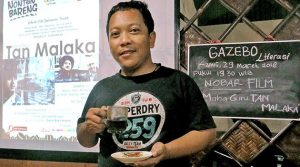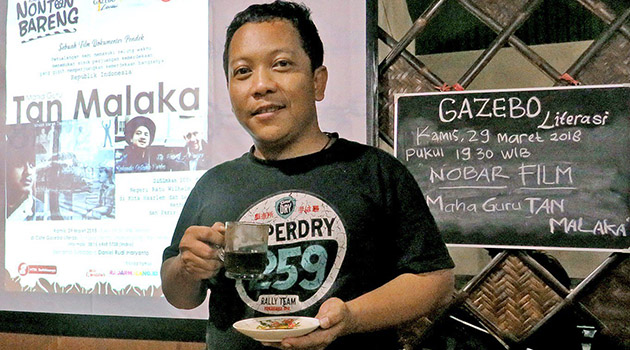Movie Sheds Light on Tan Malaka, Forgotten Leftist Hero

In a country that has banned communism, like Indonesia, having a communist figure who is also a national hero can be very complicated.
Tan Malaka, a communist and an Indonesian national hero, is still seen as a controversial figure, and his name is barely mentioned in Indonesian history due to his connection with the banned ideology.
Now, the life journey of Indonesia’s most famous rogue rebel and leftist thinker is trying to reach the younger generation through a feature film.
The film, directed by Daniel Rudi Haryanto, will be the first full-length movie about the life of Tan Malaka. The film’s short version, titled Maha Guru Tan Malaka (Great Teacher Tan Malaka), premiered in Malang, East Java, in the evening of March 29.
“I want to complement the history of Tan Malaka through a motion picture,” Daniel said when opening a discussion after the screening of his film at café Gazebo Literasi, Dau district, Malang regency.
According to Rudi, the film will later be shown on the big screen with various improvements, such as animation and extra footage and with a running time of 73 minutes, as a 73rd National Independence anniversary gift in August.
“The title will be Musim Pertama [First Season], because it tells the story of a visitor from a tropical country going through four seasons in other countries,” said Rudi.
Shot on location in Haarlem and Leiden in the Netherlands and Paris, Maha Guru Tan Malaka depicts the adventure of a character named Marco (Rolando Oktavio) in search of Tan Malaka.
Marco is an Indonesian youth studying in France. He visits several places once frequented by Tan Malaka, while studying at a teachers’ training school in Haarlem.
Tan Malaka’s residence, classroom and favorite bookstores are surveyed, accompanied by Prof. Harry A. Poeze, a Dutch historian who has researched the thoughts and life of Tan Malaka for more than 40 years.
“I’ve picked the period of 1913 to 1919 because based on Poeze’s study, it was the most important time of Tan Malaka’s engagement in the global network of the international movement,” indicated Rudi.
In one scene, Poeze takes Marco to an old bookshop in Haarlem to see Wilhelm Blos’ book titled De Fransche Revolutie (The French Revolution), which radicalized the young Tan Malaka.
Rudi, who graduated from the Jakarta Arts Institute’s Film and Television Department, is indeed known for his works in serious themes, such as the phenomenal Prison and Paradise, a Bali bombing documentary described by many circles as having opened a new discourse about terrorism.
But this time he applies a different way of understanding Tan Malaka.
Rudi has created the 32-minute flick with a contemporary touch. Its visual appearance is lightly presented in two layers, via a vlog and a reconstruction of events with hatching animation, which is handled by Sumarsono, an Indonesian animator who has also worked for Pixar and Dreamworks.
“Hatching animation is used so that this film will leave some impression, although modestly worked out,” Rudi said.
The film’s narration through Marco also follows the style of present-day youths so that its messages about the mysterious and mythical Tan Malaka can better relate to the young people of Indonesia, especially students in schools and universities.
Rudi maintained that Tan Malaka should be featured in an objective manner, although in reality he had played a major part in the international communist movement of the 1920s.
“Speaking of history, we shouldn’t be trapped in issues of stigma resulting from the previous status quo, as this will pose an impediment in facing competition on a global scale,” said Rudi.
Therefore, he appreciates Education and Culture Minister Muhadjir Effendy’s support for this film through the ministry’s directorate of history and directorate general of culture.
Government aid took the form of funds worth Rp 175 million (US$12,709) for the two-week film shootings in the Netherlands and France.
For Rudi, the limited funds available didn’t dampen his spirit to produce a quality picture.
“This film can hopefully serve as an alternative historical record and an important note for the present generation,” he said.
Courtesy : The Jakarta Post
[social_warfare buttons=”Facebook,Pinterest,LinkedIn,Twitter,Total”]



